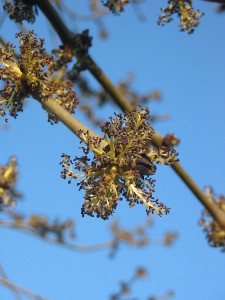Fraxinus excelsior — known as the ash, or European ash or common ash to distinguish it from other types of ash — is a species of Fraxinus native to most of Europe from Portugal to Russia, with the exception of northern Scandinavia and southern Iberia. It is also considered native in southwestern Asia from northern Turkey east to the Caucasus and Alborz mountains. The northernmost location is in the Trondheimsfjord region of Norway. The species is widely cultivated and reportedly naturalized in New Zealand and in scattered locales in the United States and Canada (Nova Scotia, New Brunswick, Quebec, Massachusetts, Connecticut, New York, New Jersey, Maryland, Ontario, Ohio, Kentucky and British Columbia).
Contents
Uses
Immature seed – usually pickled by steeping in salt and vinegar, and then used as a condiment for other foods. The leaves are sometimes used as an adulterant for tea. A manna is obtained from the tree. No further details are given. An edible oil similar to sunflower (Helianthus annuus) oil is obtained from the seed.
Benefits
Fraxinus excelsior contains many substances known for their medicinal benefits. The leaves, bark and young twigs contain coumarins (fraxin, esculin and related substances) that inhibit the growth of bacteria and fungi. These properties could make the ash beneficial as a treatment for healing wounds and sores and to reduce swelling.
The ash bark is used as a fever-reducing agent and as a substitute for quinine, which is derived from the quinine tree (Cinchona pubescens).
The bark and leaves have been used traditionally as an herbal remedy for diarrhea.
The substance fraxin found in the bark and the leaves has diuretic properties and may increase the excretion of uric acid. Due to these properties the bark could help treat gout in the elderly and may also be beneficial for other rheumatic disorders, such as osteoarthritis and rheumatoid arthritis.
Ailments associated with the bladder and kidneys are also treated with the bark. Additionally, it’s used to remove stones in the urinary tract.
The bark and the leaves of the ash tree may act as a mild laxative due to the presence of mannitol and can therefore be used as an herbal remedy for constipation and to eliminate intestinal parasites. However, compared with other laxative herbs, the effect is rather weak.
The Vikings considered the ash a sacred tree. In Norse mythology the ash Yggdrasil was an immense tree that was the center of the world and spread its crown over the whole earth. It was said it was the world tree around which the nine worlds existed.
Cautions
Please consult your doctor for more information on side effects.
Interactions
- None are recorded.
Other names
- Ash, or European ash or common ash
References
Source: Wikipedia, https://en.wikipedia.org/wiki/Fraxinus_excelsior
Herbal-supplement, http://www.herbal-supplement-resource.com/european-ash.html

